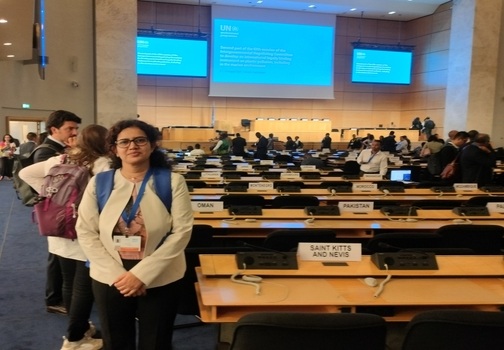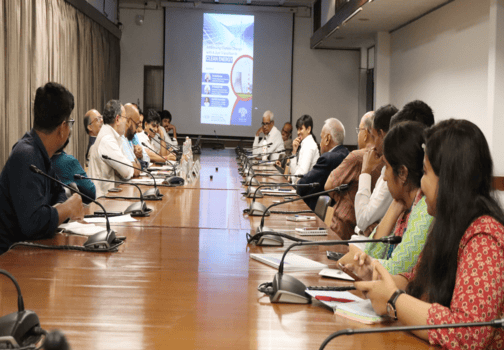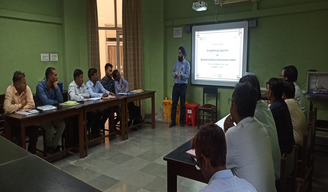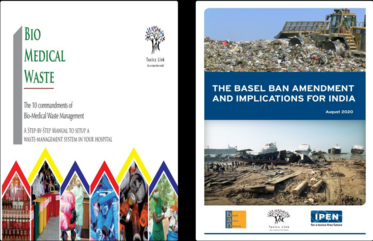SOLID WASTE MANAGEMENT
GOVERNMENT OF INDIA
MINISTRY OF SCIENCE AND TECHNOLOGY
DEPARTMENT OF SCIENCE AND TECHNOLOGY
LOK SABHA
STARRED QUESTION No. *450
ANSWERED ON 02/04/2025
SOLID WASTE MANAGEMENT
†*450. SMT. SANJNA JATAV:
Will the Minister of SCIENCE AND TECHNOLOGY be pleased to state:
(a) whether our scientists have failed to develop concrete solutions for solid waste management and pollution caused by plastic; and
(b) if so, the details of the corrective steps proposed to be taken by the Government in this regard?
ANSWER
MINISTER OF STATE (INDEPENDENT CHARGE) OF THE MINISTRY OF SCIENCE AND TECHNOLOGY & EARTH SCIENCES
(DR. JITENDRA SINGH)
(a) to (b): A statement is laid on the Table of the House.
(a) to (b): No, Sir. Indian Scientists have developed advanced technologies for solid waste management, including plastic waste. Significant progress has been made by Indian researchers, institutions, and innovators in devising technologies and strategies to manage solid waste.
i. Various technologies have been developed for effective management of the solid waste. Some of these technologies are given below: –
• CSIR-Indian Institute of Chemical Technology (CSIR-IICT) has developed a novel high-rate bio methanation technology for decentralized applications of sewage and organic solid waste. This technology is superior in terms of biogas and bio-manure production as it incorporates novel pre and post processing technologies required for the bio methanation of organic solid waste. This technology has been commercialized and is in operation.
• CSIR- Central Mechanical Engineering Research Institute (CMERI) has developed a decentralized solid waste management technology. The significant features of the technology include mechanized segregation system for biodegradable & non-biodegradable waste; Eco-friendly disposal of plastic waste through agglomeration process; Generation of bio-gas from organic waste and conversion of
Agro-waste into briquette. The technology has been transferred to industries for commercialization.
• Indian scientists have developed a technology to recycle the Construction & Demolition (C&D) waste to produce a high compressive strength Glass Foam Bricks, which are
offering a sustainable alternative to conventional building materials.
• A robust mechanical separator has been developed to facilitate the efficient disassembly of solar photovoltaic (PV) modules, supporting enhanced recycling and sustainability in the solar energy sector. Page 3 of 4
• CSIR- Advanced Materials and Processes Research Institute (AMPRI) has developed a technology for the bulk utilization of fly ash in the production of synthetic fine and coarse aggregates, which can replace conventional natural aggregates in construction, promoting sustainability and
reducing the environmental impact of traditional aggregate production.
• Indian Institutes of Science Education and Research (IISER) Tirupathi and CSIR- National Metallurgical
Laboratory (NML) has developed a technology for recycling of graphite from spent Lithium-ion batteries for high energy Li-ion capacitors.
• with the support of DST, CSIR- Institute of Himalayan Bio resource Technology (IHBT) has developed an
indigenous non-pathogenic psychrophilic bacterial formulations and composting methods for accelerated composting of municipal solid waste and agricultural waste
in cold regions.
• Ministry of Housing and Urban Affairs (MoHUA) has setup Material Recovery Facilities (MRFs) nationwide, for sorting, processing and recycling of segregated dry waste.
ii. Technologies developed for management of plastic waste:
• Department of Science and Technology (DST) through Waste Management Technologies (WMT) program, has developed and demonstrated a technology for conversion of municipal mixed plastic waste to high quality platefuls for transportation and industrial heating applications.
A 2-TPD (Tonnes Per Day) demo plant was setup at Vadodara. The plant is flexible enough to convert all kinds of mixed plastic waste collected from residential
Communities, railway establishments and industries.
• Central Institute of Petrochemicals Engineering & Technology (CIPET)-Bhubaneswar has developed an ecofriendly technology for upcycling of different grades of plastics from waste electrical and electronic equipment to high impact grade plastics.
• Recycling of plastic waste into tiles: CSIR-National Physical Laboratory (CSIR-NPL) has developed a novel technology to convert waste plastic scrap to floor tiles,
Page 4 of 4 interlock tiles, paver tiles, and roof tiles. The technology has been transferred to industry for commercialization.
• Department of Chemicals & Petrochemicals (DCPC) has established three Plastic Waste Management Centres (PWMCs) for effective plastics waste management solutions, to develop eco-friendly cost effective value
added recyclates and to establish digital demonstration facilities on plastic recycling and waste management.
• Swachh Bharat Mission (SBM): Government’s initiative like Swachh Bharat Mission (SBM) has played a key role in improving solid waste and plastic-waste management, in both urban and rural areas. In October 2021, government launched the Swachh Bharat Mission Urban 2.0 (SBM-U 2.0), with the overall vision of creating “Garbage Free Cities.” Under this mission, material recovery facilities (MRFs), waste-to-energy plants, and recycling units have been created which have led to an increase in the solid waste processing capacity by 1,05,876 TPD in the urban areas under Swachh Bharat Mission Urban.
These steps reflect Government’s commitment to bridging the gap between scientific innovation and practical implementation, ensuring sustainable solid waste management and a reduction in plastic pollution.






